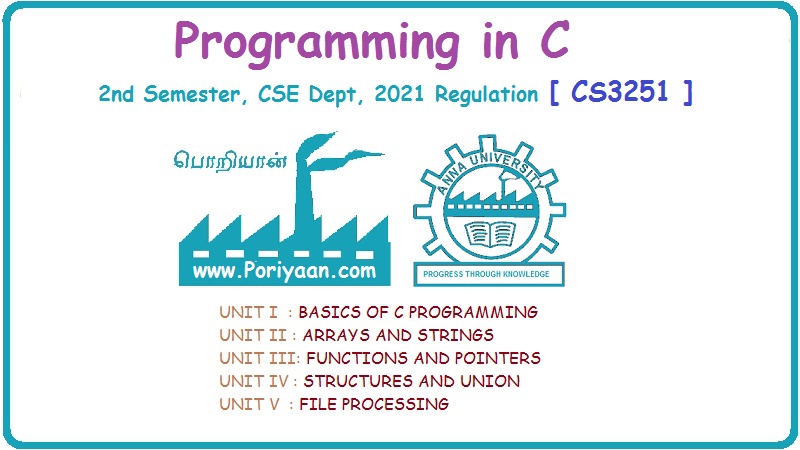Programming in C: Unit III (b): Pointers
Passing an Array to Functions
with Example C Programs | Pointers
An array can be passed to a function using pointers. For this, a function that expects an array can declare the formal parameter in either of the two following ways: func (int arr[]); OR func (int *arr);
PASSING
AN ARRAY TO A FUNCTION
An
array can be passed to a function using pointers. For this, a function that
expects an array can declare the formal parameter in either of the two
following ways:
func (int arr[]); OR func (int
*arr);
When
we pass the name of the array to a function, the address of the zeroth element
of the array is copied to the local pointer variable in the function. Observe
the difference; unlike ordinary variables the values of the elements are not
copied, only the address of the first element is copied.
When
a formal parameter is declared in a function header as an array, it is
interpreted as a pointer to a variable and not as an array. With this pointer
variable you can access all the elements of the array by using the expression, array_name + index. To find out how many
elements are there in the array, you must pass the size of the array as another
parameter to the function. So for a function that accepts an array as
parameter, the declaration should be as follows.
func (int arr[], int n); OR func
(int *arr, int n);
Look
at the following program which illustrates the use of pointers to pass an array
to a function.
21. Write a program
to read and print an array of n numbers, then find out the smallest number.
Also print the position of the smallest number.
#include <stdio.h>
void read_array (int *arr, int n);
void print_array(int *arr, int n);
void find_small (int *arr, int n,
int *small, int *pos);
int main()
{
int num [10], n, small, pos;
printf("\n Enter the size of
the array: ");
scanf("%d", &n);
read_array (num, n);
print_array (num, n)
find_small (num, n, &small,
&pos);
printf("\n The smallest number
in the array is %d at position %d", small pos);
return 0;
}
void read_array(int *arr, int n)
{
int i;
printf("\n Enter the array y
elements: ");
for (i=0; i<n;i++)
scanf("%d", &arr[i]);
}
void print_array (int *arr, int n)
{
int i;
printf("\n The array elements
are: ");
for (i=0;i<n;i++)
printf("\t %d", arr[i]);
}
void find_small (int *arr, int n,
int *small, int *pos)
{
for (i=0;i<n;i++)
{
if (* (arr+i]) < *small)
{
* small = * (arr+i);
*pos = i;
}
}
}
Output
Enter the size of size of the
array: 5
Enter the array elements: 1 2 3 4 5
The array elements are: 1 2 3 4 5
The smallest number in the array is
1 at position 0
It
is not necessary to pass the whole array to a function. We can also pass a part
of the array known as a sub-array. A pointer to a sub-array is also an array
pointer. For example, if we want to send the array starting from the third
element then we can pass the address of the third element and the size of the
sub-array, i.e., if there are 10 elements in the array, and we want to pass the
array starting from the third element, then only eight elements would be a part
of the sub-array. So the function call can be written as
func (&arr [2], 8);
Programming in C: Unit III (b): Pointers : Tag: : with Example C Programs | Pointers - Passing an Array to Functions
Related Topics
Related Subjects
Programming in C
CS3251 2nd Semester CSE Dept 2021 | Regulation | 2nd Semester CSE Dept 2021 Regulation
